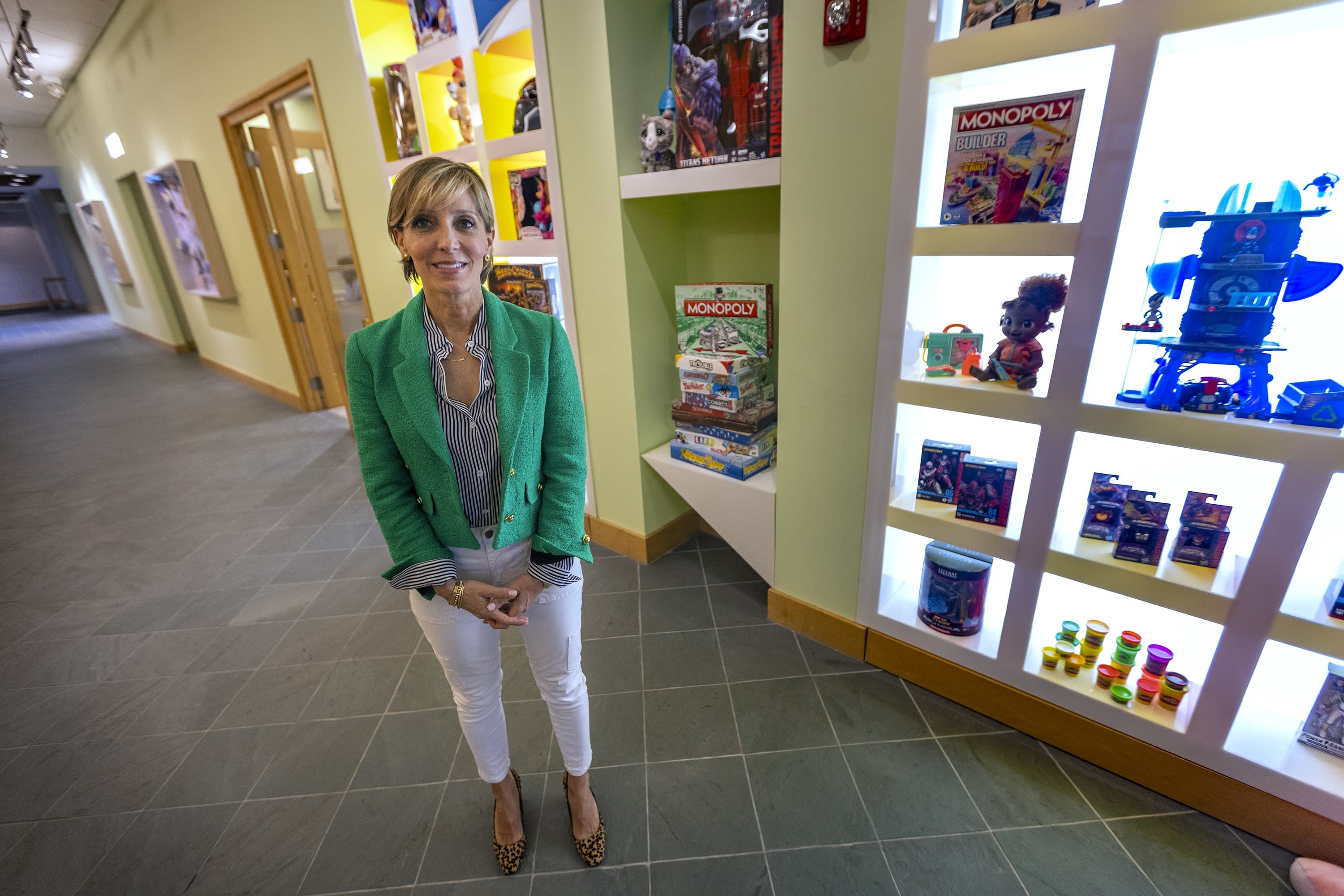Advertisement
Not just fun and games, Hasbro part of growing list of companies who say they're focused on social impact
Resume
At Hasbro headquarters in Pawtucket, Rhode Island, a backlit display showcases some of the company's iconic toys: Monopoly, Twister, Play-Doh, My Little Pony.
Although Hasbro's reputation is mostly for fun and games, the toymaker wants people to know it has a serious side, too.
It's "a company that cares about people, human rights, the environment and generally, the world," said Kathrin Belliveau, who serves as Hasbro's chief purpose officer.
Belliveau was officially appointed in 2020. Other big companies, such as Deloitte and Cisco, have similar positions.
"We think of ourselves as both the conscience and the voice of the company," Belliveau said.

Belliveau's job, as she describes it, is to think about Hasbro's business from a social and environmental lens. For example, the company plans to phase out plastic packaging by the end of this year. She's also working on improving labor practices within the company's vast supply chain.
"There's an expectation in today's world and society," Belliveau said, "that companies have a role to play in solving some of the world's problems."
Like Hasbro, more companies are talking about what they do to make the world a better place — and how their employees partake in that mission.
"I think purpose is one of those mechanisms for animating spirits inside an organization and saying, 'This is really important work,' " said George Serafeim, a professor of business administration at Harvard Business School.
Serafeim recently wrote a book titled "Purpose and Profit," in which he argues those two concepts are more intertwined than ever before. In an influential 2015 paper, Serafeim and his co-authors made the case that companies with certain socially responsible policies were likely to outperform their peers in the stock market. But other researchers have since refuted those results, finding no obvious link between corporate sustainability measures and stock returns.
Still, Serafeim believes a socially responsible mission can make companies stand out to investors and, importantly, to potential employees.
"Because they are having actually one of the most important challenges on their hands, which is attracting, retaining and developing talent," he said.
Belliveau believes the pandemic has shifted something for many people when it comes to their work. And employers, including Hasbro, are taking note.
"Employees are really looking for work that not only earns them an ability to put food on the table, support their families, educate their children, but also fulfills an individual or personal purpose or gives them meaning in their life," she said.
Purpose can be tricky to define because it's different for everyone. It might mean earning a steady paycheck or maintaining work-life balance. But research suggests that younger workers, in particular, are looking for companies that show a commitment to doing good in the world.
"I would love to work for a company that's specifically mission-driven," said Sazia Nowshin, who just graduated with an MBA from Brandeis University. She plans to look for a job that will pay her a competitive salary, allow her to afford rent in Boston, pay off her student loans and support her aging parents.
At the same time, her future employer must make a clear statement about its values on its website, she says. If it doesn't, she sees that as a red flag.
"What does that say about the company’s culture as a whole? ... I probably wouldn't be down to work for them."
Sazia Nowshin
"If that's like not even something that they address, then I mean, what does that say about the company’s culture as a whole?" she asked. "I probably wouldn't be down to work for them."
More investors have been gravitating toward a social mission, too. It's a trend represented by the buzzword: ESG, or environmental, social and governance.
ESG refers to a set of loosely-defined criteria that show a company's commitment to principles like improving the environment, fighting racism and discrimination, and using good corporate practices.
But the lure of ESG and other social impact messaging has many critics.
"I think that 99% of what you hear is marketing," said Ken Pucker, a senior lecturer at the Fletcher School at Tufts University and former COO at the apparel company Timberland.
"It's not going to drive positive social impact," he said.
"It creates a false sense of comfort that companies might solve these problems."
Ken Pucker, Tufts University
Pucker pointed out that nearly all social impact measurements are unregulated in the U.S., which puts companies in a position to determine what is good for the world — and how well they meet those standards.
While Pucker believes there are companies that are serious about doing good, he emphasized that it's the exception. Believing otherwise is not just misguided, he warned, it may be downright dangerous.
"It creates a false sense of comfort that companies might solve these problems," he said. "They're not currently configured to solve [these problems] based on the structure we work in and the incentives we have."
Suspicion that some socially-responsible investment funds might not be living up to their promises resulted in an SEC investigation of Goldman Sachs. The probe and other concerns may be cooling the enthusiasm of some ESG investors.
But Serafeim argues the idea of a 21st-century company with a positive social mission has taken hold, even if it doesn't mean businesses have fine-tuned their sense of altruism.
"Everything in organizations comes in shades of gray," he said. "So the question then is how all organizations can improve from where they are right now."
The values of the people who make up and support these companies are evolving, he said, and that is driving the way they do business.
This segment aired on June 21, 2022.
